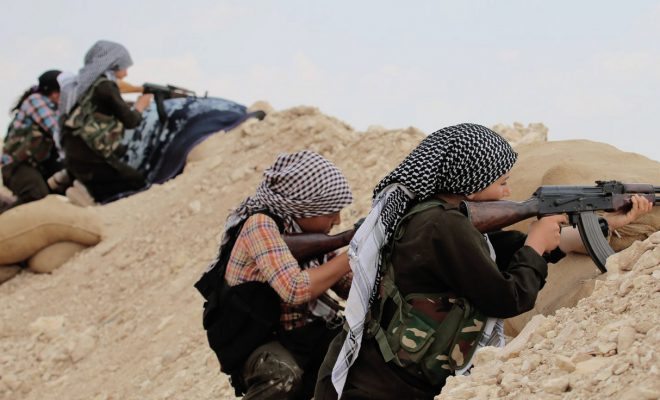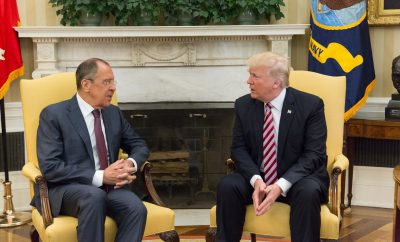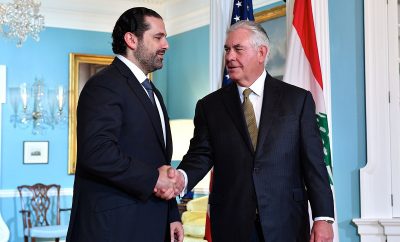 Image courtesy of [Kurdishstruggle via Flickr]
Image courtesy of [Kurdishstruggle via Flickr]
World
Why Does Peace in Syria Remain Elusive?
After years of fighting destroyed cities, led to massive waves of refugees, and killed hundreds of thousands of people in Syria, world leaders are finally coming to the table in order to reach a peace agreement. On February 1, leaders from around the region and the world met in Geneva, Switzerland in order to lay the groundwork for a deal that might end the conflict.
While even getting this far is an accomplishment, actually achieving a sustained peace is further complicated by the various regional and world powers involved, each of whom has their own agendas to satisfy. Couple that with the role of non-state actors such as ISIS and the Al-Nusra Front and the reason why peace has been so elusive becomes clearer. Read on to find out about the origins of the Syrian conflict, what each side wants and how those involved expect to create a lasting peace.
A Brief Overview
The war in Syria marks the last gasp of the Arab Spring. Beginning in March 2011, thousands of protesters took to the streets after government forces arrested, tortured, and killed opponents of the Syrian regime. But doing so escalated the conflict leading to the consolidation of several rebel factions that rose up in violent resistance. Since the conflict devolved into full-fledged civil war, there have been atrocities and war crimes committed by both the rebels and the Syrian government led by Bashar al-Assad. The most infamous were the chemical weapons attacks in 2013, which nearly led to a direct U.S. intervention. The situation was eventually resolved when the United States, Russia, and Syria reached an agreement to dispose of the Syrian chemical weapons stockpile.
Unsurprisingly, the conflict has resulted in violence and destruction on a mass scale. As of the start of 2016, an estimated 250,000 people had been killed and 11 million others have been displaced either internally or abroad. The resulting refugee crisis has reached historic proportions, testing the limits of neighboring countries and the European Union.
Who is Involved?
Due to the long-running nature of the conflict as well as the number of people killed or displaced, many of the world’s major powers have also gotten involved. The contingent opposing Assad includes Saudi Arabia, Jordan, Turkey, Qatar, the United Kingdom, France, and the United States. The countries bolstering Assad are Iran and Russia. Along with these nations are non-state actors such as ISIS and the Al Nusra Front. With all of these groups involved, to understand how the peace process hopes to work, it is first necessary to understand what they each want.
The United States and its Allies
The clearest distinction in what the two sides are hoping to achieve comes in the targets of their respective airstrikes. The U.S.-led collation has focused on targeting ISIS positions while trying not to assist Assad in any way. The coalition’s main goal is to bring the conflict to an end peacefully, ensure that Assad leaves office, and also stop the flow of refugees.
So far, the west has focused almost exclusively on defeating ISIS and not fighting the Assad regime directly. The Obama administration initially authorized a program to train rebels, but it was viewed as a disaster and the program was shut down last October. Aside from logistical problems, one area of contention was Washington’s insistence that rebels focus on fighting ISIS over Assad, which they did not agree with. In its place, the United States began to directly offer arms to the Syrian rebels.
An ideal peace agreement for the United States would involve Assad leaving power and the creation of some form of a cooperative, moderate government to take his place. Doing so would need to also enable displaced Syrians to return home and allow the United States to focus on defeating ISIS exclusively.
Russia
Much of Russia’s interests in Syria run counter to what the United States wants to see happen. This starts with Russia’s airstrikes, which have reportedly been targeting the opposition groups fighting Assad and not terrorist organizations such as ISIS. Like Iran, Russia hopes to keep its client Assad in power in Syria, however, its larger aims in Syria and the greater Middle East are far-reaching and complex. For more information about Russia’s role in the Middle East and its interests there check out this explainer.
So far, Russia has been willing to openly assert its positions even at the expense of a potential peace deal. Most recently, as countries involved in the region agreed to a version of a ceasefire, Russia embarked on an airstrike campaign to support a Syrian government attack on Aleppo, frustrating potential peace partners. For Russia, the best case scenario would be Assad maintaining his power so that Russia maintain its foothold in the area and the stability of one of its longstanding allies.
Saudi Arabia and Iran
Two other major players are Saudi Arabia and Iran. While the Saudis are tentatively an ally of the United States, the country has several important interests in the conflict. Iran is similarly situated but on the other side of the conflict, finding itself partially aligned with Russia. Both countries’ concerns with the Syrian conflict center over their expanding proxy war, which pits them against one another on religious and geopolitical grounds. The conflict was already sectarian in nature, pitting President Assad–a member of the minority ruling Shia Alawite sect–against the majority Sunnis. Iran, another Shia country, provides billions of dollars in military and economic aid to Assad. Meanwhile, Saudi Arabia has been funneling a lot of support for the Syrian rebels. The escalating feud between Iran and Saudi Arabia has already strained the existing peace efforts–the execution of a cleric in Saudi Arabia causing Iran to retaliate and tensions to rise.
For Iran, it would be a major victory if Assad is able to stay in power. Not only would it mean keeping him as a client, it would also help them maintain influence in Lebanon as well. Additionally, it would serve as a victory over both Saudi Arabia and the United States. For Saudi Arabia, victory would mean Assad losing power and a new government made up of the Sunni majority population. This would give the Saudis a badly needed win in a proxy war that has so far seen Iran gain influence throughout the gulf.
Non-State Actors
Adding fuel to the sectarian nature of this war is the presence of non-state groups such as ISIS and the Al-Qaida sponsored Nusra Front. These groups have battled each other, the other countries acting in Syria, and Assad’s forces. ISIS has proven to be the most successful and prominent group, taking and holding large chunks of territory in both Iraq and Syria. In fact, ISIS is the reason why the foreign powers are in Syria in the first place, although Russia, Iran, and likely some of the Gulf States are clearly there for other concerns as well.
The presence of ISIS and Al Nusra has severely complicated the situation in Syria. The mere presence of these groups makes any effort to arm Syrian rebels much more complicated, as countries fear that their weapons will fall into the wrong hands. Unfortunately, it is nearly impossible to distinguish who is a member of ISIS and who is just someone fighting against the regime. Aside from ISIS and Al Nusra, Iran-backed Hezbollah and the Syrian Kurdish PYD have also been involved in the fighting.
Syria
Then there’s Syria itself. The ongoing conflict has destroyed much of the country’s infrastructure and displaced massive portions of the Syrian population. Estimates indicate that the cost to fix the damage done to the country from a monetary standpoint could be as much as $200 billion. Considering how hard it has been to merely find the funds to help Syrian refugees, it appears unlikely that much money could or would be raised to rebuild an unstable country.
The best case scenario for Syria is hard to pinpoint. Assad’s departure would certainly be in the interest of the majority Sunni population, but doing so could also create a massive power vacuum furthering the rise of extremism. In this case then, perhaps forming some type of coalition which incorporates both the opposition and elements of the Assad regime in to order maintain some sort of peace may be the most that can be hoped for.
With all these parties involved and the constant infighting, little has been accomplished. The reality is, there is more than one war going on in Syria at the moment. To achieve peace in Syria, all these separate conflicts would need to be resolved at once, with the possible exception of the fight against ISIS.
The following video gives a sample of what may be next for Syria:
Peace for our Time?
In mid-December, the U.N. Security Council agreed to create a path that would eventually lead to peace in Syria. After years of violent conflict, peace talks finally began on February 1 in Geneva, Switzerland. The talks started with a U.N. special envoy Staffan de Mistura meeting separately with the government and opposition representatives. The talks are tentatively planned to last for six months. However, there is not even a preliminary understating of how, let alone if, Assad will give up power.
In fact, the only reason these talks are even taking place now is conditions are so bad in some places as to potentially demand war crime charges. The opposition only considered participating because they were promised that major headway would be made toward addressing these most serious issues. And almost immediately after the process was initiated, it was suspended due to attacks by the Syrian government with Russia’s backing. How much ultimately comes from these talks and whether they even occur as planned remains a mystery. The following video gives a quick look at some of the problems plaguing the peace talks:
Conclusion
After years of fighting, millions displaced, and hundreds of thousands dead, peace talks in Syria must be a good idea, right? Unfortunately, all available evidence suggests that there is very little chance of a sustainable peace agreement on the horizon. While talks may help strengthen diplomatic ties as the conflict rages on, there appears to be very little in the way of progress to stop the violence.
The problem with this peace process is there are too many different parties at play, with very different sets of interests and strategic goals. One side wants Assad to stay, the other will not negotiate unless he is forced to leave. But that is just one of the many questions at hand, as many parties have a wide range of strategic interests in the war. This problem is compounded further, by the fact that the opposition to Assad is a hodge-podge of groups and no one can agree on who to trust. In fact, the strongest opposition group in Syria is probably ISIS or the Al Nusra Front, but neither of them was invited to the peace conference for obvious reasons.
While some sort of peace in Syria may be possible down the road, the possibility that it is favorable for all those involved, especially the Syrian people, is far less likely.
Resources
BBC News: Syria: The Story of the conflict
BBC News: Syria Crisis: Where Key Countries Stand
Law Street Media: Why is Russia Getting Involved in the Middle East?
The Guardian: Future of Assad in Doubt as UN Unanimously Supports Syrian Peace Process
Euro News: Aleppo Assault Threatens Fragile Syrian Peace Process
Al Jazeera: Prominent Syrian Rebel Commander Killed in Airstrike
Al Jazeera: Saudi-Iran Crisis Throws a Wrench in Syria Peace Talks
History News Network: 6 Predictions About What will Happen in Syria
CNN: You Thought Syria Couldn’t Get Much Worse. Think Again
The New York Times: Syria Talks Are Suspended
BBC: Arming Syrian rebels: Where the US Went Wrong








Comments